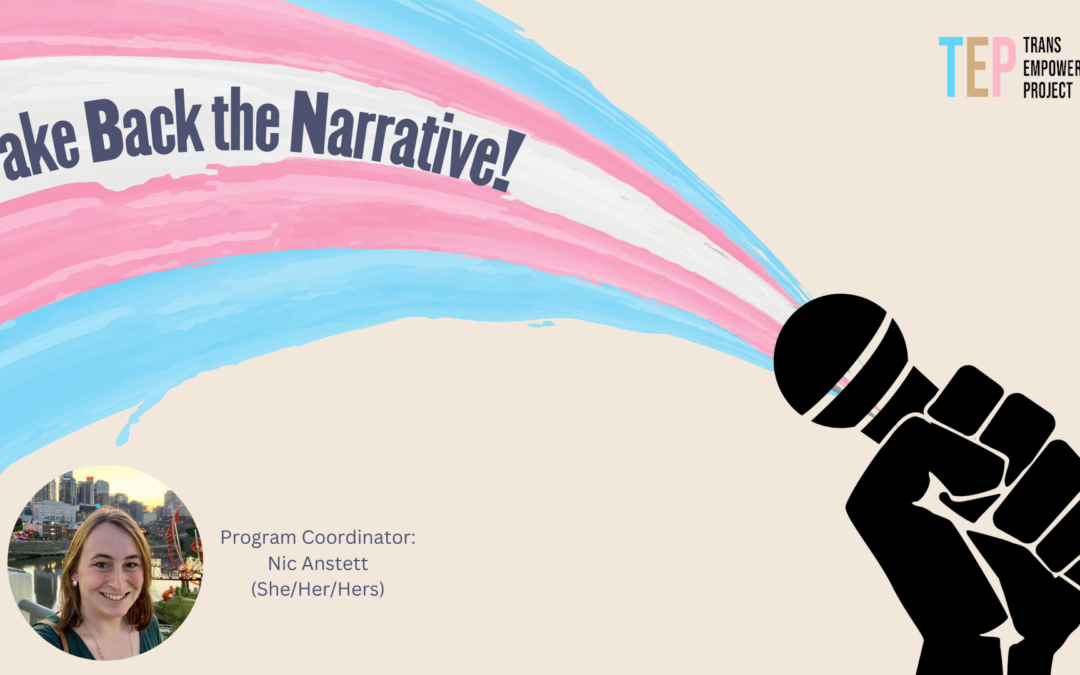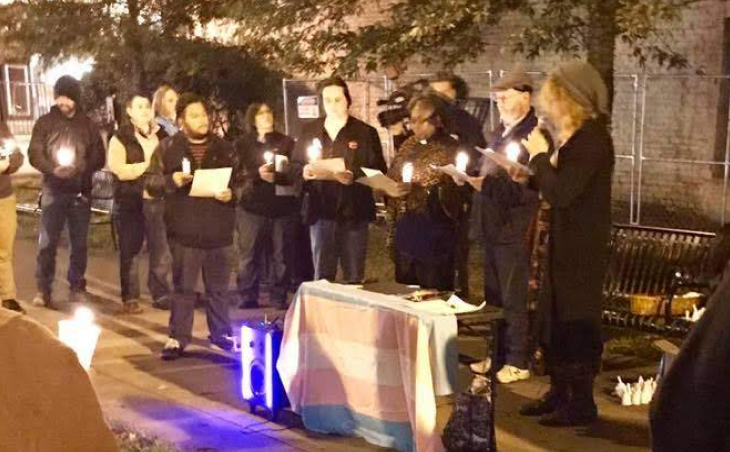

Take Back the Narrative: Alicia Arballo Expresses Trans* Grief Through Poetry
My poem, “Grief” speaks to that mindset.
Grief
By Alicia Sainz Arballo
In the early evening
a group of aging veterans
make their way up
the hill.
Flanked by the young
who know little of the
elders’ past.
Shoulders slumped, heads down,
the path anything but inviting.
Not the arduousness of the climb,
but the task:
To unbury the moment of loss.
Relive the trauma, the pain.
and fear.
Then fight through that,
and allow themselves time to grieve.
As the stars begin to peak through
the darkening sky.
Stillness.
Graying, weathered, aching,
They choose a spot to lie
facing the heavens
and invite the energy of the blackness
to surround them.
The hardened dirt,
a welcome mat
keeping each from sinking
beyond the depths into a
colorless,
feeling less,
void.
There,
they shout the names of those killed,
who fought beside them.
As the words leave their lips,
tears, then weeping,
bodies shaking.
Years of sadness and horror
locked away.
Unknowingly,
weighing each one down
with sickness, anger, and depression.
The youth surround them
laying their small hands on each.
Supporting
their energy
dissipating
the combined grief.
The last of them
pronouncing their loss,
streams of sadness
flowing down the corners
of their water filled eyes,
moistening the earth.
Gone now,
their pain
I say to myself
Is there a hill for us to climb?
A place to lay down,
yell at the stars
and let go?
Our perceptions of what has been,
For what is.
A child says to their mother
“I’m not a girl, I’m a boy.”
Let go….
A man says to his wife of 30 years,
“I’m a woman.”
Let go…..
A woman says to her girlfriends,
“I don’t feel like a woman, and I don’t feel like a man,
I’m not sure who I am.”
Let go….
Systems of gender that have held us as a society
without question
to understand the anger and fear,
and know grief is a path
where we may find a place of
stillness to
examine our feelings.
Where we may witness our discomfort,
our history of denial
and know,
without accessing this loss
and release,
allowing outstretched hands
to comfort what we’re afraid
may never be
again.
 Alicia Sainz Arballo is a transgender woman who started her medical transition at the age of 62 years old. She is a life long educator who worked for the Los Angeles Unified School district as a counselor and teacher for 36 years. She facilitated her school’s GSA club and provided teachers with professional developments to better navigate the needs of her school’s LGBTQIA+ community. She is also a musician, playing guitar since the age of six, and poet, recently participating in the “My Life is Poetry” workshop through Los Angeles LGBTQ center, and is working at publishing a chapbook on her coming out process. She holds a Bachelor of Arts in Music from California State University Northridge, and a Masters in Counseling from California Lutheran University. She continues to advocate for trans affirming health care for all ages.
Alicia Sainz Arballo is a transgender woman who started her medical transition at the age of 62 years old. She is a life long educator who worked for the Los Angeles Unified School district as a counselor and teacher for 36 years. She facilitated her school’s GSA club and provided teachers with professional developments to better navigate the needs of her school’s LGBTQIA+ community. She is also a musician, playing guitar since the age of six, and poet, recently participating in the “My Life is Poetry” workshop through Los Angeles LGBTQ center, and is working at publishing a chapbook on her coming out process. She holds a Bachelor of Arts in Music from California State University Northridge, and a Masters in Counseling from California Lutheran University. She continues to advocate for trans affirming health care for all ages.

TWoA History
Trans Week of Awareness is an annual event that starts on November 13 and leads up to Trans Day of Remembrance on November 20th. It is a time in which transgender, non-binary, and other gender-expansive advocates bring awareness to the community through education and activism.
Trans people are faced with many issues, several of which threaten their health and safety. Compared to our Cis counterparts, we’re at higher risk for assault, domestic violence, police brutality, and wrongful imprisonment – and this has been proven time and again throughout history. The murder of Rita Hester is one such case.
Rita Hester was a trans woman of color and a performer. She was a fixture of the club, known for being a bridge between the city’s queer bars and uptown’s hetero nightlife. She enjoyed cooking and often did so with her best friend, Brenda Wynne. On November 28th, 1998, Rita was expected to show up at Brenda’s apartment, but she never did.
At 6:12 that night, police were called to Rita’s apartment with reports of a fight. They found her still alive with stab wounds. But, for some reason, an ambulance did not arrive until over an hour after dispatch. Rita succumbed to cardiac arrest upon arrival at Beth Israel Hospital.
Rita was just one of many Trans people who had been killed that year (within eight months, eight others had been reported, and at the time it was estimated that at least 1 trans person would be murdered in a month-long period), but her community’s love and grief garnered some attention. Over 200 people attended her vigil, and after the disrespect shown by media outlets – repeatedly deadnaming Rita and referring to her as a “cross-dressing man”- many were moved to action.
Gwendolyn Anne Smith drew similarities between Rita’s death and Chanelle Pickett who had died three years prior. Upon realizing that no one had remembered the name of Chanelle, Gwendolyn was determined to bring visibility to all who had lost their lives. Thus began the organization of the Remembering Our Dead web project (an attempt to compile the names of murdered Trans folks from the 1970s and onwards) and Trans Day of Remembrance.
Anti-Trans violence has been a problem for well over a decade, and has become even more wide-spread since Rita’s death. Just last year, a record high of 375 trans lives worldwide were reported. With the increasing number of murders, it had become obvious that just paying respects to our fallen wasn’t enough. Too many names, too many people, were being lost, and too many of our plights were being ignored. And so Trans Week of Awareness came into being. Leading up to Trans Day of Remembrance, community members and their allies would share their stories and experiences in an effort to bring awareness to the disproportionate violence we were, and still are, experiencing.
Today we celebrate by educating our community and allies through stories, articles, discussions, workshops, and activism- addressing the various forms of prejudice, discrimination, and violence we encounter as a community.
We at TEP ask all of you to join us in spreading awareness. Share your stories. Have discussions with your loved ones about the issues trans people face, or attend workshops that focus on the dismantling of trans* oppression. Educate yourself on Trans* identity and Trans* experience. Be someone who spreads awareness. Let’s end the ignorance, together!

On Trans Awareness: Homelessness
According to a study done by The National Center for Transgender Equality, 1 in 5 transgender individuals will have experienced homelessness at one point or another.
“Why?” you may ask.
Well…
It starts early on in our youth. We come out to our families, putting faith in the comfort and acceptance they have given us, and are promptly let down. They threaten us, tell us if we don’t conform to their idea of our gender that we will no longer have a place to stay under their roof. Some of us do try to hide, but it is impossible for us to change who we are. Impossible to keep the cracking facade of a happy cis girl or boy, when we are crumbling under the dysphoria. So, we are forced onto the streets. We attempt to take residency in shelters. Some shelters deny us. Some pretend to accept us, only to force us into gendered sleeping spaces and gendered facilities each of which are based upon outdated documents. Documents that you as a youth have no means in which to update. Your signature not legal, your finances non-existent. “The documents say (this gender) so you have to be with (that gender)” Then there are the other patrons themselves. They spew slurs, threats, and general misinformation. They harass and physically harm you, and the shelter personnel have placed you so far in the complex that you can’t go to their guards for help. At the end of it all, the shelter can’t even provide you with the resources you need to get help for your situation. In the meantime, you try hard to find a real place to stay. You look at rooms for rent, and fill out their applications using the deadname that twists your stomach. They call back with rejections, whether it be due to complications with previous tenancy (because the only tenants you’ve ever known are the transphobic family that chose to discard you) or because they themselves partake in gender discrimination. You’ll search and search, and maybe you’ll get lucky. Maybe you’ll find a place that accepts you. You’ll enter the room, happy to have a roof, only to realize that this place isn’t liveable. There’s mold, vermin, cracks that line the walls. Or maybe it is livable, but a few months later you receive an eviction notice, and the whole cycle starts again.

On Trans Awareness: Employment Discrimination
In a world that prioritizes cis comfort, it’s hard to find a work environment that will treat a trans person with respect. You are constantly faced with a customer base that will scream at, belittle, and act violently toward you, and the people you work with will often not defend you and may even continue the abuse you experience. They’ll misgender you, use your deadname and the incorrect pronouns. They’ll mock you, “Well I identify as an Attack Helicopter,” or outright deny, “Pronouns are a liberal myth, you’re just confused.” They won’t accommodate for any of your needs. The uniforms are gendered, and you’re forced into an attire that doesn’t match you. Gender-neutral facilities are a rarity, and you have to choose which restroom will be less hostile. Pronouns are not used in introductions nor presented on the tags worn, further stigmatizing their existence. We ask, and we ask, but our voices don’t mean much to the cis management (because trans people are almost always denied promotions to positions of power due to gender discrimination from their supervisors) who continuously cater to their mostly cis customer base.
But that’s even assuming you get hired in the first place.
The struggles start with just applying for a position. They ask for your gender, but often don’t include options outside the binary (male, female) forcing non-binary people to choose between intense dysphoria or a label that mismatches your presentation, putting your safety at risk. They ask for your legal name, but not your preferred name (and why don’t they, plenty of people use nicknames or pen-names, why not include the line) and if you haven’t changed your name (most likely due to finances because, you know, you don’t have a job) then you’re forced to use a name that doesn’t represent you. This especially affects you later when you get the interview. They see you, hear you; a person who “dresses strangely” or who “has a weird voice”. They meet you and realize that you don’t match the name given, and they think you’ve lied to them and they toss your application out the window without another thought, because why would they want to challenge their own assumptions. And so, you move on to the next place, and the next, and the next. You get rejected, over and over again, and always for the same reasons. Because you’re Trans, and “Trans isn’t normal.”
